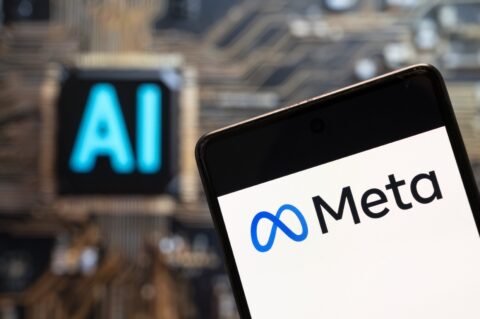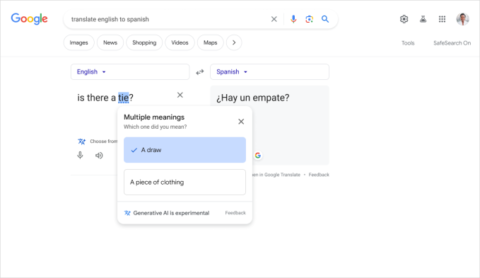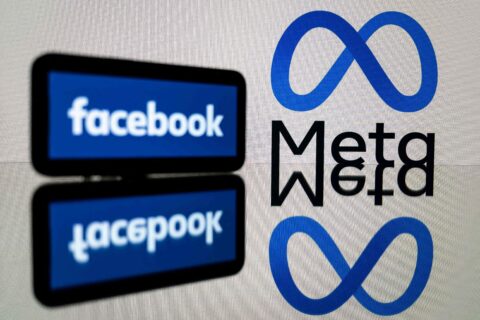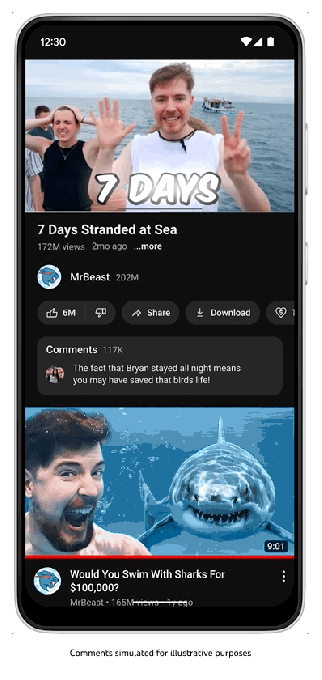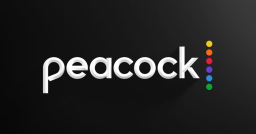Lyft’s strategy of slashing ride-hail fares to compete with Uber has resulted in slow and steady gains for the company, but competition remains fierce. According to Lyft’s third-quarter […]
Political ads on Facebook, Instagram required to disclose use of AI
Meta has introduced a set of AI rules for political advertisers on Facebook and Instagram.

OpenAI just announced its latest large language model (LLM), GPT-4 Turbo. Elon Musk’s xAI recently unveiled its own AI chatbot, Grok. And Samsung is jumping on the bandwagon, too, with its LLM, Gauss. On top of all this, AI-powered video and image generators are continuing to evolve. With artificial intelligence creating more and more content on the web, some social media platforms want users to know when media is created or altered by AI.
The latest company to step in with a set of policies around AI-created content is Meta, the parent company of Facebook and Instagram. And its new set of rules sets a standard on its platforms, specifically for political advertisers.
In a blog post on Wednesday, Meta stated it has a new policy that will force political advertisers to disclose when a Facebook or Instagram ad has been “digitally created or altered, including through the use of AI.” This includes “any photorealistic image or video, or realistic sounding audio, that was digitally created or altered.” The policy will pertain to all social issues, electoral, or political advertisements.
According to Meta’s new policy, a disclosure on an ad will be required when the advert depicts a real, existing person “saying or doing something they did not say or do.” Furthermore, if an ad contains a fictional yet realistic-looking person, it too must include a disclosure. The same goes for any political ad that uses manufactured footage of a realistic event or manipulates footage of a real event that happened.
There are some uses of AI or digital manipulation that will not require disclosures, Meta says. But these are only for uses that are “inconsequential or immaterial to the claim, assertion, or issue raised in the ad.” Meta provides examples of these exceptions, such as image size adjusting, cropping an image, color correction, and image sharpening. The company also reiterates that any digital manipulation utilizing any of those examples that does change the claims or issues in the ad would need to be disclosed.
And, of course, these AI-created or altered ads are all still subject to Facebook and Instagram’s rules around deceptive or dangerous content. The company’s fact-checking partners can still rate these ads for misinformation or deceptive content.
AI will be a more prominent factor in next year’s coming elections, such as the 2024 U.S. Presidential election, than it ever has been before. Even Meta now has its own large language model as well as an AI chatbot product. As these technologies continue to evolve, readers can be sure more online companies are going to produce a set of corporate or platform standards. With those elections on the horizon, Meta seems to be setting the ground rules for political ads now.
Meta’s new AI policy will roll out officially in 2024 and will pertain to advertisers around the globe.
Google’s AI-powered search experience expands globally to 120+ countries and territories
Google’s AI-powered search experience is rolling out worldwide, after initial launches in select markets including the U.S., India, and Japan. Starting today, the AI-based conversational experience known as […]
Meta faces pressure from human rights organizations for its role in Ethiopian conflict
A new report from Amnesty International accuses Meta of having an inciting role in an ongoing conflict in Ethiopia’s Tigray region, pressuring the company to compensate victims and reform its content moderation.

Meta, and its platform Facebook, are facing continued calls for accountability and reparations following accusations that its platforms can exacerbate violent global conflicts.
The latest push comes in the form of a new report by human rights organization Amnesty International, which looked into Meta’s content moderation policies during the beginnings of an ongoing conflict in Ethiopia’s Tigray region and the company’s failure to respond to civil society actors calling for action before and during the conflict.
Released on Oct. 30, the report — titled “A Death Sentence For My Father”: Meta’s Contribution To Human Rights Abuses in Northern Ethiopia — narrows in on the social media mechanisms behind the Ethiopian armed civil conflict and ethnic cleansing that broke out in the northern part of the country in Nov. 2020. More than 600,000 civilians were killed by battling forces aligned with Ethiopia’s federal government and those aligned with regional governments. The civil war later spread to the neighboring Amhara and Afar regions, during which time Amnesty International and other organizations documented war crimes, crimes against humanity, and the displacement of thousands of Ethiopians.
“During the conflict, Facebook (owned by Meta) in Ethiopia became awash with content inciting violence and advocating hatred,” writes Amnesty international. “Content targeting the Tigrayan community was particularly pronounced, with the Prime Minister of Ethiopia, Abiy Ahmed, pro-government activists, as well as government-aligned news pages posting content advocating hate that incited violence and discrimination against the Tigrayan community.”
The organization argues that Meta’s “surveillance-based business model” and algorithm, which “privileges ‘engagement’ at all costs” and relies on harvesting, analyzing, and profiting from people’s data, led to the rapid dissemination of hate-filled posts. A recent report by the UN-appointed International Commission of Human Rights Experts on Ethiopia (ICHREE) also noted the prevalence of online hate speech that stoked tension and violence.
Amnesty International has made similar accusations of the company for its role in the targeted attacks, murder, and displacement of Myanmar’s Rohingya community, and claims that corporate entities like Meta have a legal obligation to protect human rights and exercise due diligence under international law.
In 2022, victims of the Ethiopian war filed a lawsuit against Meta for its role in allowing inflammatory posts to remain on its social platform during the active conflict, based on an investigation by the Bureau of Investigative Journalism and the Observer. The petitioners allege that Facebook’s recommendations systems amplified hateful and violent posts and allowed users to post content inciting violence, despite being aware that it was fueling regional tensions. Some also allege that such posts led to the targeting and deaths of individuals directly.
Filed in Kenya, where Meta’s sub-Saharan African operations are based, the lawsuit is supported by Amnesty International and six other organizations, and calls on the company to establish a $1.3 billion fund (or 200 billion Kenyan shillings) to compensate victims of hate and violence on Facebook.
In addition to the reparations-based fund, Amnesty International is also calling for Meta to expand its content moderation and language capabilities in Ethiopia, as well as a public acknowledgment and apology for contributing to human rights abuses during the war, as outlined in its recent report.
The organization’s broader recommendations also include the incorporation of human rights impact assessments in the development of new AI and algorithms, an investment in local language resources for global communities at risk, and the introduction of more “friction measures” — or site design that makes the sharing of content more difficult, like limits on resharing, message forwarding, and group sizes.
Meta has previously faced criticism for allowing unchecked hate speech, misinformation, and disinformation to spread on its algorithm-based platforms, most notably during the 2016 and 2020 U.S. presidential elections. In 2022, the company established a Special Operations Center to combat the spread of misinformation, remove hate speech, and block content that incited violence on its platforms during the Russian invasion of Ukraine. It’s deployed other privacy and security tools in regions of conflict before, including a profile lockdown tool for users in Afghanistan launched in 2021.
Additionally, the company has recently come under fire for excessive moderation, or “shadow-banning”, of accounts sharing information during the humanitarian crisis in Gaza, as well as fostering harmful stereotypes of Palestinians through inaccurate translations.
Amid ongoing conflicts around the world, including continued violence in Ethiopia, human rights advocates want to see tech companies doing more to address the quick dissemination of hate-filled posts and misinformation.
“The unregulated development of Big Tech has resulted in grave human rights consequences around the world,” Amnesty International writes. “There can be no doubt that Meta’s algorithms are capable of harming societies across the world by promoting content that advocates hatred and which incites violence and discrimination, which disproportionately impacts already marginalized communities.”
Meta will start requiring disclosures for political ads manipulated with AI
In 2024, Meta will begin requiring advertisers running political or issue ads on its platforms to disclose when their ads are “digitally created or altered” through the use […]
There’s A New Subscriber-Funded Game Website Called Aftermath
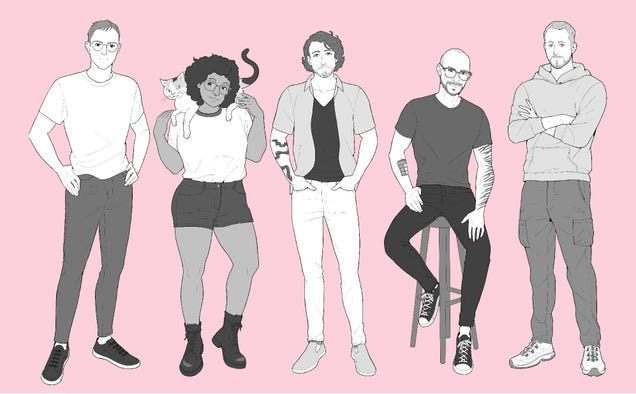
So many great video game websites have died, it’s nice to finally see some new ones being born. The latest is called Aftermath, a subscriber-funded venture by former Kotaku staffers. Full disclosure: I worked with all of these people for years and they are amazing.

9 best dating apps for lesbians, gay women in 2023
TikTok not doing it for you? These apps, including HER, Tinder and many others, may open your options for lesbian and gay dating.

Online dating as a lesbian, for the most part, still involves having your space invaded by straight people.
The heteronormative weirdness got so alienating that lesbians turned to TikTok as a means of meeting other single lesbians (and it worked), but it’s unrealistic to expect a social media app to work like a dating app for everyone. Lesbians who have exhausted their local romantic options are still going to want to see who else is out there in time for cuffing season.
And while it’s unfortunately still all too common to match with a woman just to be hit with the classic “My boyfriend and I are looking for a threesome,” dating apps have been making strides to make sure queer women actually have a space to date other queer women.
How to find the best dating apps for lesbians
Mainstream dating apps attract the most users — including queer users. These days, Hinge, Bumble, OkCupid, and even eharmony all have clear filters about looking at people of the same gender or any gender at all, as well as filters that acknowledge the existence of non-traditional relationships. Especially if you don’t live in a densely populated area, going for a more popular app can help you actually make connections.
With that said, HER is an app by and for queer women, and it’s been growing steadily. According to their website, the app has over 13 million registered users worldwide. The app also emphasizes finding community and making friends in addition to dating, giving you plenty ways to find a connection with other queer women and nonbinary folks.
For the full low down on our recommendations, check out our list below.
A note on what didn’t make the list
A decent number of dating sites and apps specifically for lesbians do exist, but most are plagued with the same issues: Either their sole purpose is to sexualize lesbians and aren’t really meant for genuine connection at all, or their lax security protocols make it way too easy for ill-intentioned men to sign up pretending to be women. (Creeps are drawn to porn-y names like Pink Flirt.) If you’re wondering why we left most of those so-called female-only apps out, that’s why.
YouTube to test generative AI features, including a comments summarizer and conversational tool
YouTube will begin to experiment with new generative AI features, the company announced today. As part of the premium package available to paid subscribers, YouTube users will be […]
The best dating apps for women: Where to find a relationship, a hookup, or something in between
The dating app where a woman will find the most success depends on what (or who) she wants. We explore when the situation calls for Bumble, an app where women initiate, eharmony, or ol’ reliable Hinge.

Being a woman on the internet is hard. Being a woman trying to find a genuine connection on an internet where potential matches feel emboldened to be creeps in the DMs and AI profile photos pique more curiosity than real ones, apparently, is digging for a metaphorical needle in a digital pit of manure.
That said, it’s not impossible. With a bit of common sense, tough skin, and a pinch of research (which we’ve so carefully done for you), there’s no need to rule online dating out as a place to find romance, a wedding date, or an animate alternative to your sex toy collection.
So, which dating app is best for women?
We can’t tell you what to do, and we honestly don’t want to. But what we can do is provide recommendations based on the entanglement you’re interested in getting into. Don’t want men to be able to message you first? Bumble. Would rather your dating pool consist only of other queer people? HER. Simply want a less game-ified feel than Tinder — or a free ride to the airport? Hinge.
But really, we know online dating is exhausting — so we’ve done the hands-on work to ensure that each of the platforms in this list goes beyond superficial swiping and generic profiles (unless, of course, that’s what you’re looking for, which we’ll state in the product description). Here are our favorite dating apps for women in any situation:
Best streaming deals Nov. 2023: Save $20 on Peacock Premium
Many streaming prices are going up, so here’s how to swing Paramount+, NFL Sunday Ticket, and more for less.

UPDATE: Nov. 4, 2023, 5:00 a.m. EDT This post has been updated with the latest streaming deals and pricing on streaming service bundles.
Get one month free of any Paramount+ plan
(Save up to $12)

Netflix Premium and NFL+ Premium bundle
(Save $10/month)

One year of Peacock Premium
(save $20)

Hulu monthly subscription
(save $6 per month (for eligible college students))

Streaming services have become a modern cultural staple: we build them into our monthly bills alongside rent and electricity. However, there are always loopholes to get out of paying full price for the top apps. If you’ve had your eye on a particular streaming service, see if this week’s best streaming deals are the incentive you’ve been waiting for.
Our top pick

Opens in a new window
Why we like it
If you’re looking for a one-stop shop to watch TV classics like Scrubs and New Girl, new releases like Love Island Games or Five Nights at Freddy’s, and some Sunday Night Football, Peacock is the streaming service for you. For a limited time, you can score $20 off an annual subscription to Peacock Premium with the code BIGTENFAN, getting you access to all of the above, and more, for just $40 a year.
If you’re looking to avoid ads, you can also apply this coupon code and get $20 off an annual Peacock Premium Plus subscription, bringing it down from $119.99 to $99.99.
More streaming deals and ongoing bundles
Amazon Prime Video
-
No current subscription deals, but try it with a 30-day free trial
AMC+
-
No current standalone deals, but try it with a seven-day free trial
-
Pay just $5 for your first month through Sling TV, with no Sling subscription required (save $3.99)
Apple TV+
-
Get three free months at Best Buy just because (save $6.99/month)
-
Get three free months with the purchase of an Apple product
-
Students get free Apple TV+ along with an Apple Music subscription for a limited time (save $6.99/month)
-
T-Mobile customers with a Go5G Plus plan get a free subscription
Curiosity Stream
-
No current deals
DirecTV Stream
-
Get three free months of Max, Showtime, Starz, MGM+, and Cinemax with purchase of the Ultimate package (save $161.97)
-
New customers get $10 off each month for their first three months of DirecTV stream (save $30)
-
Get $400 in Visa Reward cards when you sign up for two years of DirecTV and show proof of purchase of NFL Sunday Ticket from YouTube
-
Get $100 in Visa Reward cards when you sign up for the Entertainment plan at $79.99/month (no NFL Sunday Ticket purchase required)
Disney+
-
Disney+, Hulu, and ESPN+ (with ads) — $14.99/month (save $11.98/month)
-
Disney+, Hulu, and ESPN+ (no ads) — $21.99/month (save $20.98/month)
FuboTV
-
Try it with a seven-day free trial
-
New subscribers get 30 days free of FuboTV Pro if you’re a My Best Buy Plus or Total member (save $74.99)
-
Get 30 days for free when you buy select Fire TV devices at Best Buy
Max
-
Max (with ads) — $99.99/year (save $1.66/month)
-
Max (no ads) — $149.99/year (save $3.50/month)
-
Max Ultimate (no ads) — $199.99/year (save $3.33/month)
Hulu
-
Eligible college students can get a monthly subscription for $1.99 per month (save $6 per month)
-
Try for free with a 30-day trial
MGM+
-
Get six free months when you buy a Fire TV device at Amazon
-
Try for free with a seven-day trial
Netflix
-
Verizon customers can get a year of Netflix for free when they AMC+ through Verizon play+
-
Verizon customers can also bundle Netflix Premium and NFL+ Premium plans through +play for just $25/month (save $10/month)
-
T-Mobile customers with Go5G and Go5G Plus plans can save between $9.99 and $15.49/month on Netflix Basic or Standard
NFL Sunday Ticket
-
Eligible users get two free months of Max when they bundle NFL Sunday Ticket and Youtube TV through Nov. 30
Paramount+
-
Select MyPanera members can get a free three-month Walmart+ subscription and select Verizon MyPlan members can save $2.95/month on a Walmart+ subscription (Walmart+ unlocks Paramount+ Essential)
-
Get one month free of any Paramount+ plan with code REDEEM30
Peacock
-
Peacock Premium for students — $1.99/month for 12 months (save $3/month)
Philo
-
No current standalone deals, but try it with a seven-day free trial
Showtime
-
No current standalone deals, but try it with a seven-day free trial
Sling TV
-
Get 50% off your first month of Sling Orange, Sling Blue, or Sling Orange & Blue
-
Get a free Fire TV Stick Lite (a $40 value) and $10 off your first month (save $50)
Starz
-
Get three months for $5/month (save $5/month)
YouTube TV
-
New users can lock in their three months of the YouTube TV Base Plan for just $50.99 instead of $72.99 (save $60)

